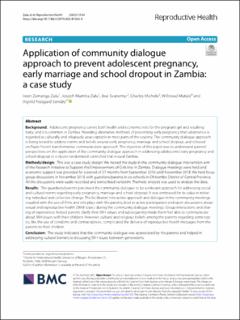| dc.contributor.author | Zulu, Ireen Zamanga | |
| dc.contributor.author | Zulu, Joseph Mumba | |
| dc.contributor.author | Svanemyr, Joar | |
| dc.contributor.author | Michelo, Charles Cheembo | |
| dc.contributor.author | Mutale, Wilbroad | |
| dc.contributor.author | Sandøy, Ingvild Fossgard | |
| dc.date.accessioned | 2022-12-28T14:26:28Z | |
| dc.date.available | 2022-12-28T14:26:28Z | |
| dc.date.created | 2022-05-19T12:37:20Z | |
| dc.date.issued | 2022 | |
| dc.identifier.issn | 1742-4755 | |
| dc.identifier.uri | https://hdl.handle.net/11250/3039669 | |
| dc.description.abstract | Background
Adolescent pregnancy carries both health and economic risks for the pregnant girl and resulting baby, and it is common in Zambia. Providing alternative methods of preventing early pregnancy than abstinence is regarded as culturally and religiously unacceptable in most parts of the country. The community dialogue approach is being tested to address norms and beliefs around early pregnancy, marriage and school dropout, and is based on Paulo Freire’s transformative communication approach. The objective of this paper was to understand parents’ perspectives on the application of the community dialogue approach in addressing adolescents’ early pregnancy and school dropout in a cluster randomized controlled trial in rural Zambia.
Methods/design
This was a case study design. We nested the study in the community dialogue intervention arm of the Research Initiative to Support the Empowerment of Girls trial in Zambia. Dialogue meetings were held and economic support was provided for a period of 27 months from September 2016 until November 2018. We held focus group discussions in November 2018 with guardians/parents in six schools in Chibombo District of Central Province. All the discussions were audio recorded and transcribed verbatim. Thematic analysis was used to analyze the data.
Results
The guardians/parents perceived the community dialogue to be a relevant approach for addressing social and cultural norms regarding early pregnancy, marriage and school dropout. It was embraced for its value in initiating individual and collective change. The facilitators’ interactive approach and dialogue in the community meetings coupled with the use of films and role plays with the parents, lead to active participation and open discussions about sexual and reproductive health (SRH) topics during the community dialogue meetings. Group interactions and sharing of experiences helped parents clarify their SRH values and subsequently made them feel able to communicate about SRH issues with their children. However, cultural and religious beliefs among the parents regarding some topics, like the use of condoms and contraceptives, complicated the delivery of reproductive health messages from the parents to their children.
Conclusion
The study indicated that the community dialogue was appreciated by the parents and helped in addressing cultural barriers to discussing SRH issues between generations. | en_US |
| dc.language.iso | eng | en_US |
| dc.publisher | BMC | en_US |
| dc.rights | Navngivelse 4.0 Internasjonal | * |
| dc.rights.uri | http://creativecommons.org/licenses/by/4.0/deed.no | * |
| dc.title | Application of community dialogue approach to prevent adolescent pregnancy, early marriage and school dropout in Zambia: a case study | en_US |
| dc.type | Journal article | en_US |
| dc.type | Peer reviewed | en_US |
| dc.description.version | publishedVersion | en_US |
| dc.rights.holder | Copyright 2022 The Author(s) | en_US |
| dc.source.articlenumber | 30 | en_US |
| cristin.ispublished | true | |
| cristin.fulltext | original | |
| cristin.qualitycode | 1 | |
| dc.identifier.doi | 10.1186/s12978-022-01335-8 | |
| dc.identifier.cristin | 2025598 | |
| dc.source.journal | Reproductive Health | en_US |
| dc.relation.project | Norges forskningsråd: 223269 | en_US |
| dc.identifier.citation | Reproductive Health. 2022, 19, 30. | en_US |
| dc.source.volume | 19 | en_US |
| dc.source.issue | 1 | en_US |

